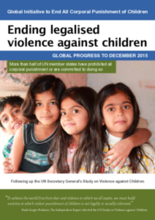The report discusses progress made towards universal prohibition of corporal punishment of children, including by highlighting examples from individual states that have recently implemented legal and policy reforms. As of the end of 2015, more than half of all United Nations member states have achieved a prohibition of corporal punishment in all settings (including the home) or are committed to implementing such prohibition. In total, 48 member states have now prohibited all corporal punishment and another 52 member states have made a commitment to full prohibition. However, there are still 150 states where children can be lawfully hit in the family home, 143 where violent punishment remains lawful in alternative care and in day care settings, 71 where corporal punishment is not prohibited in all schools, and 62 that lack protection against corporal punishment for children in penal institutions.
The report also considers prohibition and elimination of corporal punishment in the context of the new Sustainable Development Goals, particularly target 16.2 under which states have committed to work to “End abuse, exploitation, trafficking and all forms of violence against and torture of children.” In addition, the report addresses the increasing involvement of faith-based advocacy for reform to end corporal punishment. It discusses initiatives by religious leaders and members of faith-based communities and organisations that are increasingly taking action towards prohibition and elimination of corporal punishment and speaking out as powerful advocates for children.
Lastly, the report discusses the latest research relating to corporal punishment, including a recent UNICEF report that reported that violent “discipline” was the most common form of violence against children across all regions. Approximately 6 out of every 10 children aged 2 to 14 years has been physically punished at home in a given month. The research is increasingly revealing that prohibition in law is needed to achieve the attitudinal and behavioural change required to eliminate corporal punishment, leading researchers to call for legal prohibition of corporal punishment in order to promote its elimination.

